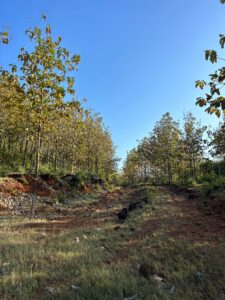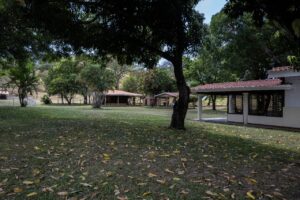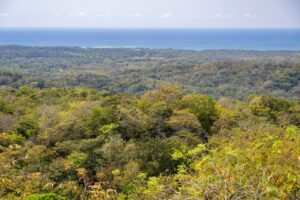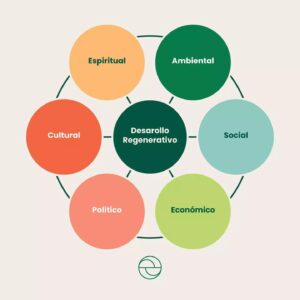I’m back in Costa Rica, the country where I underwent my forest therapy guide training, and where my planned 10-day stay in 2020 stretched to nearly 5 months as borders closed due to the global pandemic. During that time, amidst the panic and crisis gripping the world, a profound experience in the heart of a forest in the province of Sarapiqui made it clear to me that I was meant to stay. Listening to the forest that day was perhaps one of the best decisions of my life, greatly influencing the work I do today.
Four years later, my return to Costa Rica was prompted by a Donut Economy workshop in London, where I discovered that Costa Rica aligns best from all countries, with the framework of addressing social needs within planetary boundaries. There’s something remarkable about the country’s path, which might have started in 1948, when President Figueres Ferrer abolished the army and redirected defense funds to education and the environment.
My research led me to the Costa Rica Regenerativa initiative, spearheaded by Eduard Müller, who has extensive experience driving the environmental agenda in Costa Rica and beyond. Our paths crossed serendipitously, the day after crossing the border from Nicaragua, while I was meeting with two Israeli entrepreneurs engaged in impressive regeneration work around Tamarindo.
A few days later, I found myself at Eduard’s home and his regenerative farm project, Rancho Kosmos, located in the province of Guanacaste. This region has endured significant deforestation for cattle ranching and later monoculture teak production, exacerbating water scarcity in an already drought-prone area. Finca Kosmos represents Eduard’s broader vision for urgently scaling up regeneration efforts as we approach critical tipping points in our climate and biodiversity crises.


Eduard is also the founder of UCI – Universidad para la Cooperación Internacional, which he established 30 years ago to cultivate a new generation of leaders and professionals with a deep understanding of nature’s interconnectedness with humanity and spirituality. The university has now shifted its curriculum towards regeneration, with Finca Kosmos envisioned as a learning center supported by rigorous biodiversity monitoring, aimed at training a cadre of first responders to our biodiversity crisis.

Eduard’s theory of transformation emphasizes the need for professionals who comprehend nature’s workings, integrating society, spirituality, and ecology into a holistic curriculum that transcends the fragmented thinking of the industrial revolution. Among UCI’s courses, including master’s and shorter certificate programs, is the Certificate of Regenerative Entrepreneurship. This course begins with biomimicry, not merely mimicking nature in structure but understanding its underlying principles. For Eduard, the challenge lies in the process of unlearning; our systems are deeply entrenched in a fragmented Newtonian worldview, perpetuated by the industrial revolution of specialization and mass production, conflicting with the integrated web of life and ecological principles. It’s again the idea I’ve heard from spiritual teachers, scientists and philosophers, that the regeneration of the planet is only possible with the regeneration of people and ourselves.

The shortage of properly trained individuals to implement regenerative projects worldwide is evident to me in every project I invest in, engage with, or visit. Often, there’s a trial-and-error learning process that can take years and lead many projects to early financial ruin. The key difference between successful and failed projects lies in the depth of understanding of nature among those involved and their ability to collaborate with nature rather than oppose it.
In addition to establishing an education hub in Costa Rica for global participants, Eduard has created a network of regenerative projects, connecting mentors with entrepreneurs worldwide. The potential for job creation and entirely new career paths arising from our biodiversity crisis and climate challenges is remarkable. As we discussed while sipping coffee amidst his fields, it’s time to shift focus from training new coders and limiting young people’s education opportunities to areas already disrupted by AI. There are broader avenues for youth to engage in more meaningful careers in regenerative agriculture, entrepreneurship, tourism, health and education, or even the combination of all these areas.
To support Eduard in his endeavor to build an army of first responders for regeneration, please visit the link below to offer a scholarship to a deserving student or to enroll yourself or your organization’s leaders in one of his regenerative courses.

